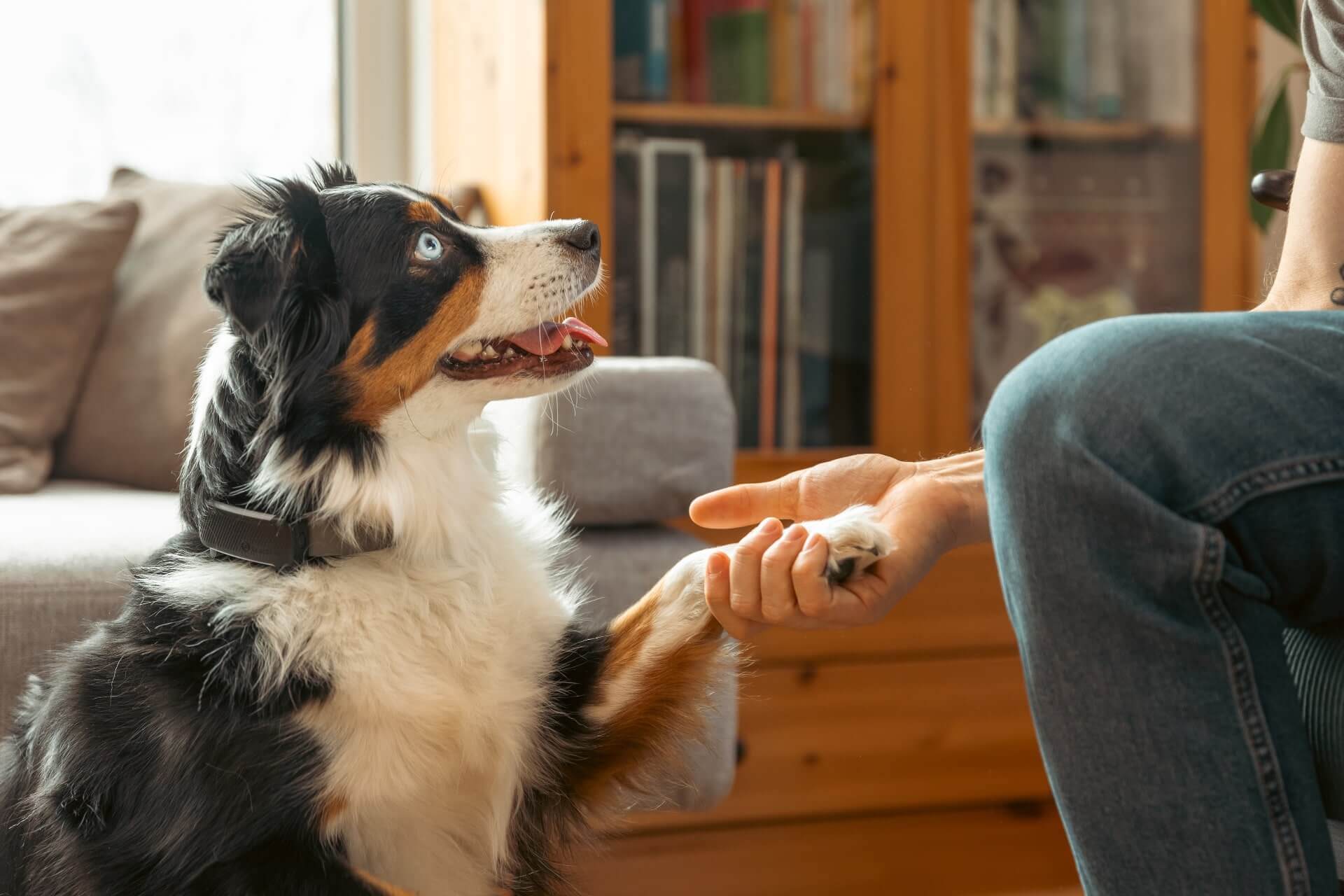 Approved by Dr. Dwight Alleyne, DVM
Approved by Dr. Dwight Alleyne, DVM How To Manage Seasonal Allergies In Dogs
Just like us, our furry friends can run afoul of the local allergen population. Here's how to manage them - for good.

For some of our furry friends, the change in seasons can bring a less-than-pleasant companion: seasonal allergies. If you’ve noticed them scratching more, licking their paws incessantly, or even sneezing, it could be due to environmental allergens. But on the bright side, seasonal allergies in dogs are common and often manageable. Let’s dive into how to help them find some relief – and where a smart dog tracker with Health Monitoring can help.
Key Takeaways
Seasonal allergies in dogs are common and often manifest as skin issues like itching, redness, and ear infections.
Common allergens include pollen (trees, grasses, weeds), mold spores, dust mites, and flea saliva, with specific allergens peaking in different seasons.
Your vet will diagnose a seasonal allergy by ruling out other conditions and testing your dog for allergies. For treatment, they might recommend medications, allergy shots, and/or topical treatments.
A smart dog tracker with Health Monitoring can help you pick up on subtle changes in your dog’s activity, sleep, breathing, and heart rate. So you have an early warning system that prompts you to get them checked up earlier at the vet.

Always know your buddy is healthy & safe
Read more- What causes seasonal allergies in dogs?
- Allergens your dog might run into – by the season
- Signs & symptoms of seasonal allergies in dogs
- How your vet might diagnose & treat your dog’s seasonal allergies
- How you can manage your dog’s seasonal allergies at home
- How a smart dog tracker with Health Monitoring can step in
What causes seasonal allergies in dogs?
Just like us, dogs can be sensitive to things in their environment that are more prevalent during certain times of the year. The usual suspects include:
- Pollen
From trees, grasses, and weeds – this is a big one, especially in spring and summer. - Mold spores
These can be found outdoors in damp areas, particularly in fall. - Dust mites
While present year-round, their populations can fluctuate with humidity. - Flea saliva
Although not strictly seasonal, fleas that lead to allergies are more commonly present during the warmer seasons.
Allergens your dog might run into – by the season
When your dog comes into contact with these allergens (often through inhalation or direct skin contact), their immune system overreacts, leading to some uncomfortable symptoms.
| Season | Common allergens |
|---|---|
| Spring | Tree pollen (oak, birch, maple, cedar), grass pollen |
| Summer | Grass pollen, weed pollen (ragweed), mold spores |
| Fall | Weed pollen (ragweed, goldenrod), mold spores (from decaying leaves) |
| Winter | Dust mites, indoor mold, dry air (can exacerbate skin issues) |
💡A smart dog tracker with GPS and Health Monitoring can help you monitor your dog’s vital signs – like their breathing rate. if it’s elevated or otherwise different from normal, it could be a hidden sign they’re experiencing a seasonal allergy or another, more serious health issue.

Get health alerts for your dog
Our pups can’t always tell us if something’s wrong. But if their tracker detects unusual changes in their routine, you’ll get an alert, helping you catch potential issues early.
Are some dog breeds just itchier than others?
Yup – some dog breeds do have a genetic predisposition to developing environmental allergies. This means their immune systems are more likely to overreact to common allergens. Here are a couple of examples:
- Golden Retrievers
Beloved for their friendly nature, but unfortunately, highly susceptible to skin allergies, often presenting as itchy skin and ear infections. - Cocker Spaniels
With their large, floppy ears, these dogs tend to be prone to ear infections due to allergies. - Bulldogs (e.g., French, English)
Brachycephalic dog breeds often deal with skin fold dermatitis and environmental allergies. This can turn up as itching around their face, paws, and armpits. Their wrinkles can trap moisture and allergens, making them prone to skin issues and allergies. - German Shepherds
While robust, German Shepherds can be prone to various skin conditions, including environmental allergies that cause itching and hot spots. - Boxers
Another breed that frequently experiences allergic skin reactions, often showing up as red, inflamed skin and itching. - Pugs
Their facial folds can make them susceptible to skin irritation, and they are also prone to general environmental allergies. - Terriers (e.g., West Highland White Terriers, Boston Terriers)
Many terrier breeds have a genetic predisposition to sensitive skin and allergies.
If you have one of these breeds, or any dog with a history of skin issues, it’s especially important to be vigilant about allergy symptoms. Make sure to work closely with your vet on a preventive and management plan.
Signs & symptoms of seasonal allergies in dogs
Unlike humans who often get runny noses and watery eyes, dogs typically show seasonal allergy symptoms through their skin. Here’s what to keep an eye out for:
- Intense itching
This is the most common sign. Your dog might scratch, lick, or chew at their skin excessively. - Red, inflamed skin
Especially in areas like the paws, belly, armpits, and ears. - Hair loss
From constant scratching and licking. - Hot spots
These are moist, red, painful lesions caused by compulsive licking and chewing. - Ear infections
Frequent head shaking, ear scratching, redness, or discharge in the ears. Your dog’s ears might also have a foul smell. - Paw licking/chewing
Dogs often lick their paws to soothe irritation. - Rubbing face/body
Against furniture or carpets to reduce any itching. - Sneezing or runny eyes
While less common than skin issues, some dogs do exhibit respiratory symptoms. - Gastrointestinal upset
In rare cases, allergies can manifest as vomiting or diarrhea.
If you notice any of these signs, it’s a good idea to get in touch with your vet. Keep an eye out for how long the symptoms have been persisting for, how severe they are, and whether they tend to crop up around certain times of the year.
How your vet might diagnose & treat your dog’s seasonal allergies
Your vet will start with a thorough physical examination and discuss your dog’s history and symptoms. They’ll want to rule out other potential causes for the itching, such as fleas, mites, or fungal infections. Because of this, they might perform a skin scrape, fungal culture, or even a blood test to figure out the underlying condition.
If your vet suspects seasonal allergies, they might recommend intra-dermal skin testing. In this case, they’ll inject a tiny amount of the allergen under your dog’s skin to test which one causes a reaction. Then, they might send a sample of your dog’s blood to a lab to measure the antibodies against specific allergens. Based on what’s causing them, your vet might recommend:
- Medication
Including antihistamines, corticosteroids, or even immunosuppressnts. All of these can help provide relief from your dog’s symptoms. However, do check with your vet what side effects each might have considering your dog’s health. - Allergy shots
Your vet might inject a small amount of allergens into your dog to help their immune system get used to them. Over the long-term, this can help your dog’s allergic reactions reduce in severity. - Topical treatments
Including medicated shampoos and conditioners, sprays, wipes, and mousses for soothing irritated skin, washing away allergens, and providing relief. - Flea and tick preventives
Which might include medication, spot-on treatments, sprays, or even special collars. Here’s a post covering some options for flea and tick preventives for dogs in detail.
How you can manage your dog’s seasonal allergies at home
Make sure to bathe your dog regularly with a gentle, hypoallergenic shampoo to wash off allergens from their coat. Your vet might recommend a specific medicated shampoo. After walks, wipe your dog’s paws with a damp cloth or pet-safe paw wipes to remove pollen and other irritants. If possible, walk your dog in the early morning or late evening when pollen counts are lower. For very sensitive dogs, a light doggie shirt or booties might help reduce direct allergen contact.
Next, make sure your living space is clean. Regularly vacuum and dust your home, especially if your dog spends a lot of time indoors. Wash their bedding frequently. Consider using a HEPA air filter in your home to reduce airborne allergens.
Your dog’s diet also goes a long way. Some specific nutritional supplements can help improve skin barrier function and reduce inflammation. Just make sure to get the green light from your vet first – always.
What’s the difference between seasonal scratching and chronic skin conditions in dogs?
The most significant difference is the timing. If your dog’s itching and skin issues consistently flare up during specific seasons (e.g., every spring when pollen counts rise, or every fall when leaves decay and mold spores are abundant), it’s a strong indicator of seasonal allergies. Chronic skin conditions, on the other hand, tend to persist year-round, though their severity might fluctuate.
Keeping a log of when your dog’s symptoms begin and end can provide valuable clues.
- Seasonal: Symptoms appear and disappear with the seasons.
- Chronic: Symptoms are present continuously, even if they have good and bad days.
Next, consider any changes you’ve recently made to your dog’s environment. For example, have you recently changed their bedding, shampoo, or cleaning products used in your home? Sometimes, a new product can trigger an allergic reaction that might mimic seasonal allergies but is actually a contact dermatitis. Eliminating new products for a period can help determine if they are the cause.
Flea allergy dermatitis is another common cause of itching in dogs and can often be mistaken for seasonal allergies. Make sure your dog is on a consistent and effective flea and tick prevention program year-round. Even a single flea bite can cause intense itching in a sensitive dog. If your dog is still scratching despite being on preventives, it points more towards environmental or food allergies rather than fleas.
With a little observation and detective work, you can help pinpoint the exact cause of your dog’s discomfort and get them the most effective treatment. Always make sure to consult with your vet before taking action.
How a smart dog tracker with Health Monitoring can step in
Keeping track of your dog’s vital signs – like their breathing rate – can be an important clue in figuring out if they’re struggling with a health issue. That’s where a smart dog tracker, like Tractive, can lend a hand.

Strapped to your dog’s collar, you can now:
- Monitor your dog’s activity levels
Seasonal allergies in dogs are often subtle – showing up in easy to miss signs like lethargy or restlessness. Your tracker monitors your dog’s active minutes throughout the day, so you can pick up quicker on a change that might signal discomfort or pain. - Check your dog’s vital signs
An increased breathing rate or heart rate can signal stress, pain, or an underlying issue. (Especially if your dog hasn’t been exercising extra lately.) If your dog is sneezing more than usual, you’ll catch on to a change in their baseline breathing rate more easily.
- Keep track of your dog’s sleep
If itching worsens at night, it can disrupt your dog’s sleep. Your Tractive device monitors your dog’s sleep patterns and helps you figure out if they’re experiencing restless sleep or frequent wakeups. All possible signs their allergies are flaring up and causing discomfort. - Spot potential health issues early
Even if you miss a day of checking on your dog’s health data, your tracker sends you a Health Alert if there’s a weird change from their activity or sleep. (That could be a health red flag.) So you can take action earlier and get them checked at a vet much in advance. - Figure out where your dog’s been running into any allergens
From your dog’s Heat Map and Location History, which shows you where they’ve been spending most of their time. Which could include any pollen-riddled wooded areas near your property or even your neighbors’ farmlands.
With time, you’ll be better-equipped to understand your dog’s “normal” activity, sleep, breathing, and heart rate. So it’ll be easier for you to identify when something is off, especially during allergy season.
Ultimately, managing seasonal allergies in dogs is all about being prepared for them. By staying a little vigilant of your dog’s symptoms, staying in touch with your vet, and setting up a supportive home environment, you’ll be going a long way. (With a little help from a smart dog tracker to help you keep track of their symptoms, of course.)
Your furry friend’s health and wellbeing means as much as to us as it does to you. So we’ve made it a priority to only share medically-relevant content on our blog. This post was checked, double-checked, and medically verified by Georgia-based vet, Dr. Dwight Alleyne.

Dr. Dwight Alleyne, DVM
Originally from Long Island, New York, Dr. Alleyne began his career at a no-kill animal shelter before becoming a licensed veterinary technician. He graduated from Cornell University Veterinary College in 2006 and completed an internship at Purdue University. Now practicing in Georgia, Dr. Alleyne specializes in soft tissue surgery and ultrasounds. He also writes pet health articles on his website, “The Animal Doctor Blog” (www.anmldrblog.com).



